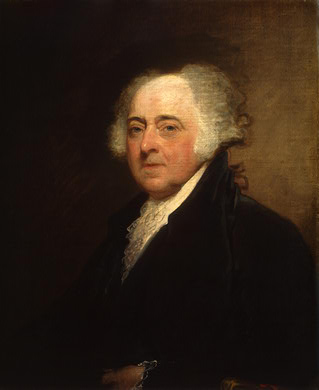On the Boston Tea Party (17 December 1773)
1750s, Diaries (1750s-1790s)
John Adams: Zitate auf Englisch
“Let them revere nothing but religion, morality and liberty.”
Letter to Abigail Adams (15 April 1776) http://www.masshist.org/digitaladams/aea/cfm/doc.cfm?id=L17760415ja
1770s
Letter to Joseph Ward, 8 January 1810 http://founders.archives.gov/documents/Adams/99-02-02-5495, stating his belief in the reports of James T. Callender that Thomas Jefferson was the father of the children of Sally Hemmings; also quoted in Scandalmonger (2001) by William Safire, p. 431
1810s
Letter to Benjamin Rush, 4 April 1790. Alexander Biddle, Old Family Letters, Series A (Philadelphia: 1892), p. 55 http://books.google.com/books?id=5d8hAAAAMAAJ&pg=PA55
1790s
Entry for 17 February 1756 in Charles Francis Adams, The Works of John Adams vol. 2, 10-1
1750s, Diaries (1750s-1790s)
1800s, Letter to George Churchman and Jacob Lindley (1801)
Letter to Thomas Jefferson (15 July 1817)
1810s
As quoted in Complete Book of U.S. Presidents (1984), by William A. DeGregorio, pp. 19–20
1760s, A Dissertation on the Canon and Feudal Law (1765)
No. 3
1770s, Novanglus essays (1774–1775)
“I agree with you that in politics the middle way is none at all.”
Letter to Horatio Gates (23 March 1776)
1770s
“Think of your forefathers! Think of your posterity!”
John Quincy Adams, his son, in a speech at Plymouth, Massachusetts (1802-12-22).
Misattributed
Letter to Abigail Adams (22 May 1777), as quoted in And the War Came: The Slavery Quarrel and the American Civil War https://books.google.com/books?id=WbFznb7PSGsC&printsec=frontcover&source=gbs_ge_summary_r&cad=0#v=onepage&q&f=false, by Donald J. Meyers
1770s
Letter to Abigail Adams (17 July 1775); in L. H. Butterfield, ed., Adams Family Correspondence (1963), vol. 1, p. 216
1770s
1780s, Letter to John Jay (1786)
1770s, Thoughts on Government (1776)
“Let every sluice of knowledge be opened and set a-flowing.”
1760s, A Dissertation on the Canon and Feudal Law (1765)
John Adams, letter to Thomas Jefferson (16 July 1814). From the Works of John Adams, Vol. X http://books.google.com/books?id=9G0vAAAAYAAJ&dq=works%20of%20john%20adams%20%22volume%20x%22&pg=PA100#v=onepage&q&f=false, p. 100
1810s
“We recognize no sovereign but God, and no king but Jesus!”
Originally attributed to the “Rev. Jonas Clarke or one of his company” in “No King But King Jesus” (2001) ( cache at Internet Archive http://web.archive.org/web/20010422194315/www.truthinhistory.org/NoKing.htm) by Charles A. Jennings on his website Truth in History http://www.truthinhistory.org, and subsequently attributed to Adams in books like Is God with America? (2006) by Bob Klingenberg, p. 208, and Silenced in the Schoolhouse (2008) by Michael Williams, p. 5. (The mistake may have come about because John Adams and John Hancock are mentioned in Jennings' account immediately before Clark.) This is supposed to have been said in reply to Major Pitcairn's demand to “Disperse, ye villains, lay down your arms in the name of George the Sovereign King of England.” Clark's own account http://books.google.com/books?id=9S8eAAAAMAAJ&pg=PA6#v=onepage&q&f=false makes no mention or this (or any other) reply, however. “No king but King Jesus” was the slogan of the Fifth Monarchists https://en.wikipedia.org/wiki/Fifth_Monarchists during the Interregnum in England, but there is little evidence for its use during the American Revolution.
Misattributed
First Address to Congress (23 November 1797) http://books.google.com/books?id=_EeUpTCXs1sC&pg=PA115&dq=%22The+consequences+arising+from+the+continual+accumulation+of+public+debts+in+other+countries+ought+to+admonish+us+to+be+careful+to+prevent+their+growth+in+our+own%22&hl=en&ei=wqNLTKb7G42NnQeo_52CDw&sa=X&oi=book_result&ct=result&resnum=1&ved=0CCcQ6AEwAA#v=onepage&q=%22The%20consequences%20arising%20from%20the%20continual%20accumulation%20of%20public%20debts%20in%20other%20countries%20ought%20to%20admonish%20us%20to%20be%20careful%20to%20prevent%20their%20growth%20in%20our%20own%22&f=false
1790s
XVIII, p. 484
1810s, Letters to John Taylor (1814)
“Children should be educated and instructed in the principles of freedom.”
Quelle: 1780s, A Defence of the Constitutions of Government (1787), Ch. 3 Marchamont Nedham : Errors of Government and Rules of Policy" Seventh Rule
Letter to Baron Van Der Capellen (21 January 1781), Amsterdam. http://oll.libertyfund.org/titles/2105#lf1431-07_head_239
1780s
“Thus mystery is made a convenient cover for absurdity.”
Entry of 13 February 1756 in Charles Francis Adams, The Works of John Adams, Second President of the United States: With a Life of the Author, Notes, and Illustrations vol. 2 (Boston: Charles C. Little and James Brown, 1850) 4, Google Books, 13 December 2010, web http://books.google.co.uk/books?id=BGYFAAAAQAAJ&pg=PA5&dq=%2215+sunday+staid+at+home%22&hl=en&sa=X&ei=YJlsU4u-FsPBOKu3gaAI&ved=0CDUQ6AEwAA#v=onepage&q=%2215%20sunday%20staid%20at%20home%22&f=false
1750s, Diaries (1750s-1790s)
Kontext: Major Greene this evening fell into some conversation with me about the Divinity and satisfaction of Jesus Christ. All the argument he advanced was, "that a mere creature or finite being could not make satisfaction to infinite justice for any crimes," and that "these things are very mysterious."
Thus mystery is made a convenient cover for absurdity.
1790s, Inaugural Address (Saturday, March 4, 1797)
On the decision to proclaim independence from British rule, which was made on 2 July 1776, in a letter to Abigail Adams (3 July 1776), published in The Adams Papers: Adams Family Correspondence (2007) edited by Margaret A. Hogan
1770s
Article 11 http://avalon.law.yale.edu/18th_century/bar1796t.asp#art11 of the Treaty of Tripoli (signed at Tripoli on November 4, 1796, and at Algiers on January 3, 1797 and received ratification unanimously from the U.S. Senate on June 7, 1797; it was signed into law by John Adams (the original language is by Joel Barlow, U.S. Consul); This phrase has also sometimes been misattributed to George Washington, and has also been misquoted as "This nation of ours was not founded on Christian principles".
Misattributed
1810s, Letter to William Tudor (1818)
